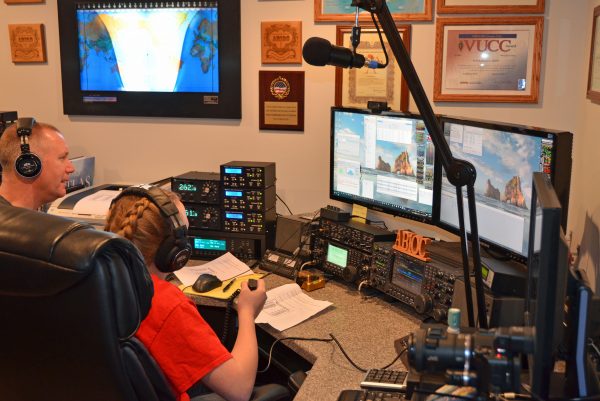
In 2020, we hosted the first Nashua Area Radio Society Student-Teacher Contest Series. Our goals for the Series include:
- Creating an opportunity for students and their teachers to have fun and learn about contesting
- Providing an opportunity to learn and develop Amateur Radio skills via Radio Contesting
- Provide equipment to student and teacher members who invest time in learning about Amateur Radio through Radio Contesting
2020 Winners
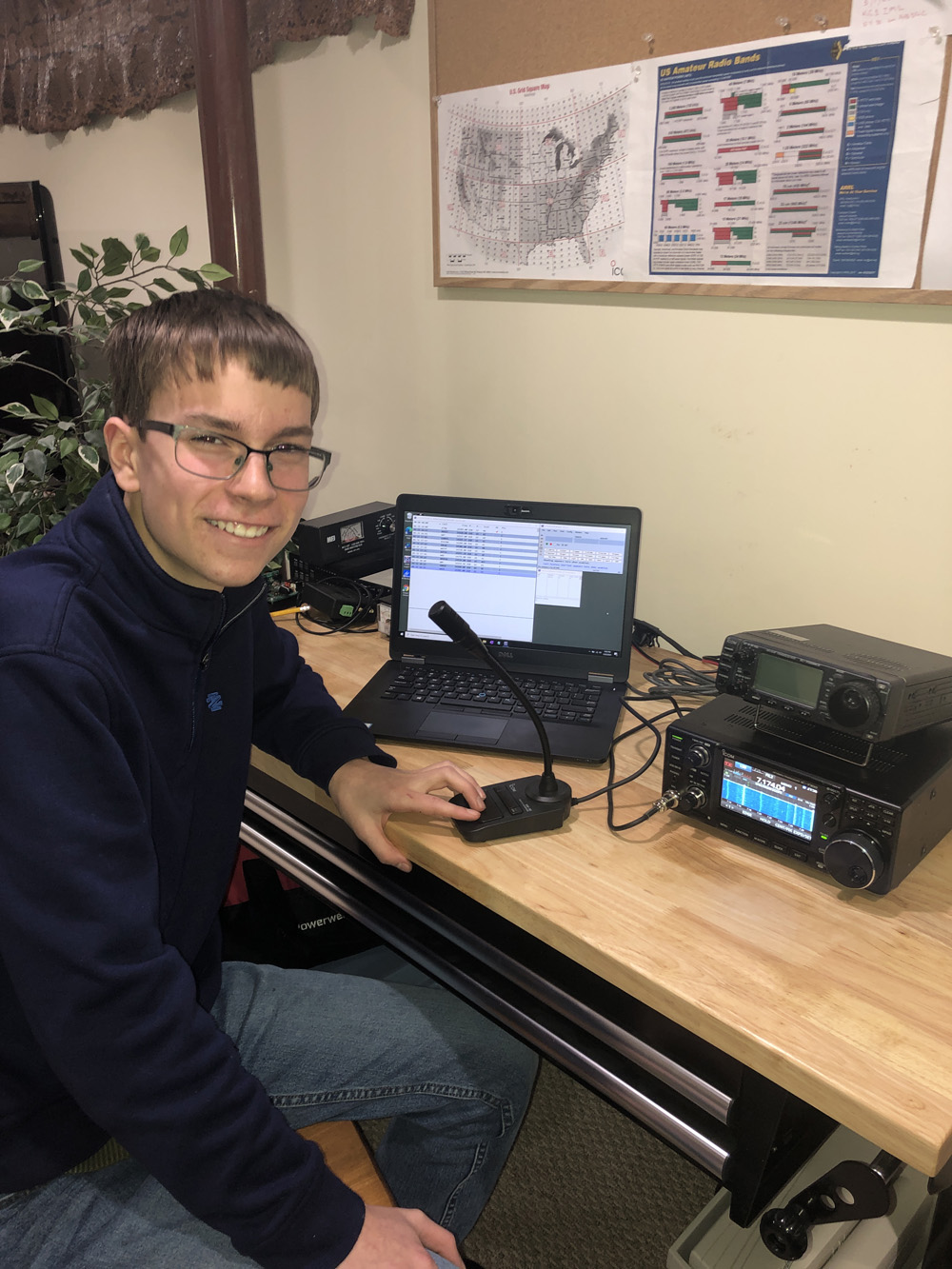
Congratulations to Keith Sangillo, KC1IMK, who won 1st place. Keith chose the Icom IC-7300 for his prize.
Abby Finchum, AB1BY took 2nd place and won the reconditioned DXEngineering Hex Beam Antenna.
Kenzie Pooler, KE1NZY came in 3rd and won th reconditioned Buckmaster 7-band OCF Dipole Antenna and LMR-400uF coax.
The following is the final standing of the 2020 contest entrants. You can click on the links in the table below to learn more about each of our competitors.
| Position | Name | Callsign | Total Score | Best Entries |
|---|---|---|---|---|
| 1 | Keith Sangillo | KC1IMK | 1208 | WFD, NEQP, SFD, 13 COL |
| 2 | Abby Finchum | AB1BY | 1180 | WFD, NEQP, 13 COL, 13 COL |
| 3 | Mackenzie Pooler | KE1NZY | 479 | NAQP RTTY; ARRL DX |
| 4 | Dan Pooler | AC1EN | 341 | NAQP RTTY; ARRL DX |
Competitor Entries
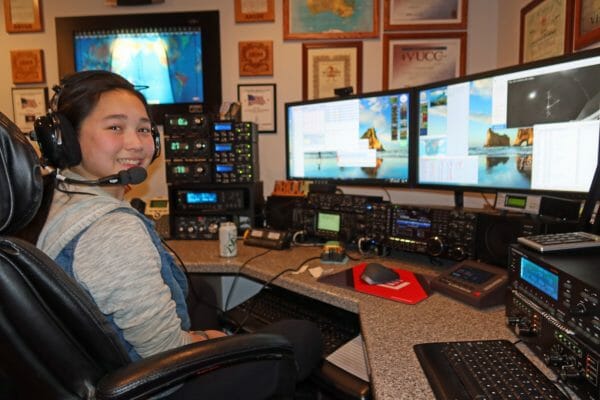
The table which follows list all of the entries received by the Student-Teacher Contest Director. Note that contacts that are Duplicates under the rules outlined here, incomplete or obviously inaccurate QSO may have been removed by the Student-Teacher Contest Director when computing entry scores.
| Date | Contest / Event | Callsign | Contacts | <100W | @Home or FD | Score |
|---|---|---|---|---|---|---|
| 11/22/20 | ARRL Sweepstakes | KC1IMK | 13 | Y | Y | 52 |
| 7/6/20 | 13 Colonies | AB1BY | 190 | N | N | 190 |
| 7/5/20 | 13 Colonies | AB1BY | 178 | N | N | 178 |
| 7/2/20 | 13 Colonies | KC1IMK | 281 | N | N | 281 |
| 6/28/20 | Summer Field Day | AB1BY | 37 | Y | N | 74 |
| 6/27/20 | Summer Field Day 2020 | KC1IMK | 179 | Y | N | 358 |
| 5/3/20 | New England QSO Party | KC1IMK | 181 | Y | N | 362 |
| 5/2/20 | New England QSO Party | AB1BY | 193 | Y | N | 386 |
| 3/8/20 | ARRL DX SSB | KC1IMK | 11 | Y | Y | 44 |
| 3/7/20 | ARRL DX SSB | AB1BY | 27 | N | Y | 54 |
| 3/7/20 | ARRL DX SSB | KE1NZY | 119 | N | N | 119 |
| 3/7/20 | ARRL DX SSB | AC1EN | 117 | N | N | 117 |
| 2/29/20 | NAQP RTTY | KE1NZY | 180 | Y | N | 360 |
| 2/29/20 | NAQP RTTY | AC1EN | 112 | Y | N | 224 |
| 1/26/20 | Winter Field Day 2020 | KC1IMK | 69 | Y | Y | 207 |
| 1/25/20 | Winter Field Day 2020 | AB1BY | 142 | Y | Y | 426 |
Student-Teacher Contest Period
Entrants may submit their entries in the Eligible Contests listed below through contest scores submitted by midnight eastern time on November 24th, 2020.
We know that some of our competitors do not have home stations. In addition, others have been planning to operate from AB1OC-AB1QB and other host stations to help improve their overall scores.
Unfortunately, access to stations outside our competitor’s homes are currently on hold due to the situation with the COVID-19 pandemic. To make the series fair, we will extend the end date for submitting entries to be three months beyond the time when we can open AB1OC-AB1QB and other host stations to all competitors. This will enable everyone to have a chance to use host stations for at least 3 of their 4 four contest entries.
Format and Rules
This is the first year that we’ve run the Student-Teacher Contest Series. We know that our competitors are just getting started in Radio Contesting. As a result, we want to encourage them to get on the air and become comfortable with making contacts during contests. To this end, we are making the scoring very basic. Scoring will be about the total number of contacts made that are not duplicates per the rules of the contest they are entering.
All of the material on this page collectively constitutes the rules for the 2020 Student-Teacher contest series.
Who is Eligible?
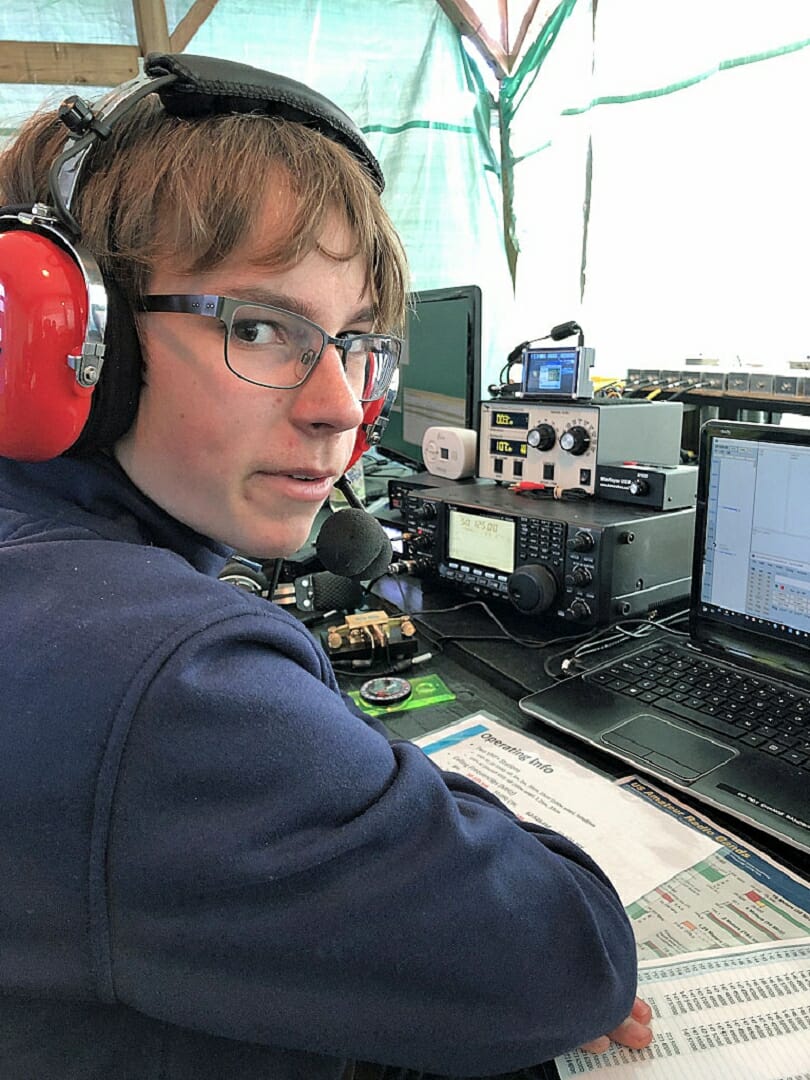
- NARS Regular, student, or Senior Member in good standing who are grades 1 – 12 Students holding a valid Amateur Radio License that provides the on-air privileges needed to compete.
- Teachers who have a Student in their School who is competing in the contest. Teachers must also be NARS Members as outlined in the previous bullet.
Student-Teacher Contest Series Basics
- Entries are permitted using scores from the contests listed in the Eligible Contests section below. All rules of the associated contest must be followed.
- You must be a NARS Regular or Senior Member in good standing to enter.
- Contestants must submit their logs in ADIF form to the Student-Teacher Contest Director within 7 days of when the associated contest ends. Each submission must include the start and end times for the 3 consecutive hours to be used as your entry. Submissions must also include an indication of the maximum power used during the submitted 3 hour period and the location that the contestant operated from.
- Starting with contests held in April 2020, Contestants are also required to submit their logs directly to the contest sponsoring organization. We are adding this rule to encourage Contestants to learn how to submit logs for the contests that they enter. Contest participants will be required to confirm that they had submitted their log to the contest organization when submitting their ADIF to the Student-Teacher Contest Director. The Nashua Area Radio Society will handle submitting logs from Field Day.
Scoring
- Competitors count the total number of non-duplicate contacts during their best 3 consecutive hours in one of the eligible contests
- The Student-Teacher Contest Director removes duplicate QSOs from the logs that competitors submit in ADIF form and applies the appropriate multiplies to compute the competitor’s score for the associated contest.
- An entrant’s score for each of their contest entries is computed as follows:
Score = non-duplicate contacts X multipliers
The non-duplicate contacts number is computed using the total number of contacts made from a contestant’s submitted log for a consecutive 3-hour period that they designate when submitting their logs.
- Medium Power QSO Multiplier – applied to contacts made using 100W or less. The Medium Power QSO Multiplier will be 2. A contestant must use 100W PEP or less for all contacts made in the 3-hour period that they use for their entry to qualify.
- Home Station & Field Day Station QSO Multipliers – applied when operating from a Home Station or from a NARS sponsored Summer or Winter Field Day. The Home Station Multiplier is 2 and the Field Day Station Multiplier is 1.5. Competitors who wish to operate as a guest at someone else’s station should check in advance with the Student-Teacher Contest Director to determine if the station they want to use will be eligible for the Home Station Multiplier.
- A Contestant’s total score will be the sum of the 4 highest individual contest entries that they submit. A contestant must submit at least 4 contest scores to be eligible to win a prize. More than 4 contest submissions are encouraged!
- A contestant’s leaderboard ranking is determined by adding their best 4 contest scores together.
- To make the contest scoring manageable, we will use a consistent definition for duplicate contacts that is independent of the method used for any given contest. A Contact will be considered a Duplicate if another contact with the same Callsign on the same Band that uses the same Mode exists and has been counted in a contestant’s score. Duplicate contacts will not count towards an entrant’s score.
How to Enter
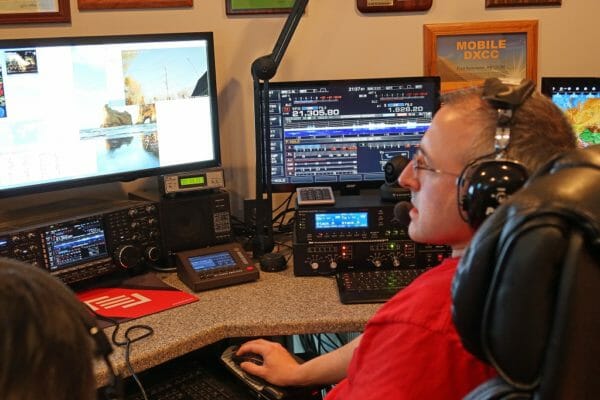
Please notify the Student-Teacher Contest Director that you would like to participate in the Student-Teacher Contest Series. You can do this by emailing Anita, AB1QB at [email protected]. Your email should include your name, callsign, and an email address where you can be reached.
Contestants operate in at least 4 of the Eligible Contests listed here and submit their logs in ADIF form to the Student-Teacher Contest Director.
Eligible Contests
The table which follows lists the contests that qualify for the Student-Teacher Contest Series. The notes column includes any additional conditions for entry via the associated contest.
| Dates | Contest | Period | Modes | FTx? | Notes |
|---|---|---|---|---|---|
| Jan 25 | Winter Field Day | 24 hours | SSB, Digi, CW | NARS Stations only | |
| Feb 15 | ARRL CW DX | 48 hours | CW | ||
| Feb 29 | NAQP RTTY | 12 hours | RTTY | 100W max | |
| Mar 7 | ARRL SSB DX | 48 hours | SSB | ||
| Mar 21 | BARTG RTTY | 48 hours | RTTY | ||
| Mar 28 | CQ WPX SSB | 48 hours | SSB | ||
| Apr 4 | North American SSB Sprint | 4 hours | SSB | ||
| Apr 27 | RSGB FT4 Contest Series++ | 90 minutes | FT4 | FT4 | 80m only, 100W max |
| May 2 | New England QSO Party | Two periods over 2 days | SSB, Digi, CW | ||
| May 18 | RSGB FT4 Contest Series++ | 90 minutes | FT4 | FT4 | 80m only, 100W max |
| May 30 | CQ WPX CW | 48 hours | CW | ||
| Jun 15 | RSGB FT4 Contest Series++ | 90 minutes | FT4 | FT4 | 80m only, 100W max |
| Jun 27 | Summer Field Day | 24 hours | SSB, Digi, CW | FT8 & FT4 | NARS Stations only |
| Jul 1 | Thirteen Colonies Special Event | 6 days | SSB, Digi, CW | FT8 & FT4 | Approved NH Stations only |
| Jul 18 | NAQP RTTY | 12 hours | RTTY | 100W max | |
| Jul 27 | RSGB FT4 Contest Series++ | 90 minutes | FT4 | FT4 | 80m only, 100W max |
| Aug 1 | NAQP CW | 12 hours | CW | 100W max | |
| Aug 15 | NAQP SSB | 12 hours | SSB | 100W max | |
| Aug 31 | Worldwide Digi DX | 24 hours | FT8/FT4 Only | FT8 & FT4 | |
| Sep 19 | NH QSO Party | Two periods over 2 days | SSB, Digi, CW | ||
| Sep 28 | CQ WW DX RTTY | 48 hours | RTTY | ||
| Sep 28 | RSGB FT4 Contest Series++ | 90 minutes | FT4 | FT4 | 80m only, 100W max |
| Oct 19 | RSGB FT4 Contest Series++ | 90 minutes | FT4 | FT4 | 80m only, 100W max |
| Oct 31 | CQ WW DX SSB | 48 hours | SSB | ||
| Nov 1 | North American SSB Sprint | 4 hours | SSB | ||
| Nov 16 | RSGB FT4 Contest Series++ | 90 minutes | FT4 | FT4 | 80m only, 100W max |
| Nov 21 | ARRL Sweepstakes SSB | 30 hours | SSB |
++You can enter via the RSGB FT4 Series but you must operate in at least two of the sessions in the RSGB FT4 Series. Your entry will consist of your best two sessions in this contest and will count as a single entry in the Student-Teacher Contest Series.
Note: In case of any conflicts with the information in the above table, the official contest rules apply.
Entering via The 13 Colonies Special Event
Fred, AB1OC is the State Manager for K2K New Hampshire as part of the Annual Thirteen Colonies Special Event. We know that this event, while not a contest, is a great way to develop operating skills that are relevant to contesting. To this end, we will include The Thirteen Colonies Special Event in the list of Eligible Contests. The following additional rules will apply to Student-Teacher Contest Series entries via Thirteen Colonies:
- Entrants must operate from a Station in New Hampshire that is pre-qualified by the State Manager, AB1OC.
- Contestants must use the K2K call sign when operating in the Thirteen Colonies Special Event.
- Duplicate Contacts (multiple calls from the same callsign using the same band and mode) will not count toward the final entry score.
- There will be a to be determined multiplier applied to contacts submitted via Thirteen Colonies. The multiplier will be determined in June before the Thirteen Colonies Special Event begins. The multiplier will create an adjustment to account for the large pileups and the ability to run at high rates for sustained periods during the event.
- Self-spotting and announcing the station’s operating frequency via Social Media postings and live streaming video will be permitted
- FT8 and FT4 modes may be used as part of this event. Contestants are not permitted to operate as a Fox in Fox and Hound mode.
- The WARC-bands (30m, 17m, and 12m) may be used during the Thirteen Colonies Special Event only. The VHF and above bands also may be used.
Student-Teacher Contest Awards & Prizes
Awards Prizes will be awarded at the December Nashua Area Radio Society Membership Meeting based upon the final, combined best 4 contest scores submitted by midnight eastern time on November 24th, 2020.
Contestants who meet the requirements for entry will be allowed to choose their prizes in the order of their standing on the final Leader Board. The prizes are as follows:
- A new Icom IC-7300 Transceiver
- A reconditioned DXengineering Hex Beam Antenna **
- A reconditioned Buckmaster 7-band OCF Dipole Antenna and LMR-400uF coax **
** The Winner will be invited to participate in the reconditioning work as a way to learn about Amateur Radio Antennas.
In addition, the top 5 contestants who submit qualifying entries for 4 or more contests in the Student-Teacher Contest Series will receive a copy of the book Amateur Radio Contesting for Beginners by Doug Grant, K1DG.
Finally, Award Certificates will be provided to the top 5 entrants.
The decision of the NARS Contest Director on the final Leaderboard and the associated order of selecting prizes will be final.
Posting Livestream Video & Posts on Social Media
We encourage contestants to live stream video and share their experiences during and after contest via social media. Announcing your operating frequency, indicating on the air that you are posting or live stream on Social Media or other information that would qualify as self-spotting is not allowed except when operating in the 13 Colonies Special event as K2K. Contest audio may be shared as long as its not used to respond to information posted on social media by other stations. Also, live stream video may not show the contestant’s operating frequency.
Student-Teacher Contest Director
The Student-Teacher Contest Director, Anita AB1QB will make all determinations related to the rules. Anita’s decisions on the rules and contest scoring are final. Anita can be reached at [email protected].
Student-Teacher Contest FAQs
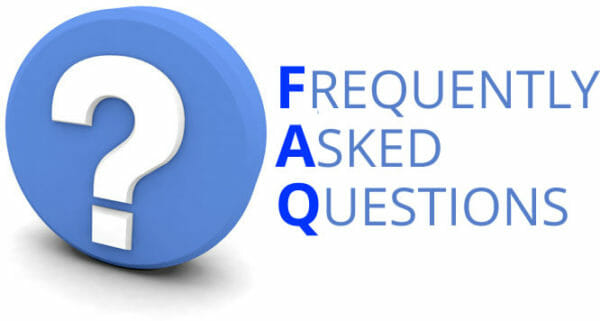
Here’s some Q&A to explain our approach further.
Q: Don’t contests use multipliers for things like DXCCs, States, etc.? Why don’t those count towards the scores?
A: Most of our competitors have not participated in many contests before. Also, some may have “mic-fright”, etc. We feel that making their initial experience simple by just being about the number of contacts made is the best way to encourage participation and basic radio skills development.
Q: What about weighting different modes in terms of contact contribution to a competitor’s total score?
A: Our competitors are mostly relatively recent licensees and do not know CW yet. We considered weighting digital contacts more heavily than phone modes. We decided against this to encourage our competitors to develop their phone skills more fully (many already prefer digital modes). Expect us to modify the scoring in this area in a later round of our contest series as our competitors gain experience and learn CW.
Q: Is there a power multiplier?
A: Yes. The QSO multiplier for contacts made using 100W or less will be 2. A contestant must use 100W or less for all contacts made in the 3-hour period of their entry.
Q: Some contests have QRP multipliers. Why aren’t these included in the series?
A: QRP power creates unique challenges and may not be the best mode for less experienced operators. We want to encourage the students and teachers who participate in the contest to have a good experience. We feel that this is best done by using at least 100W.
Q: What about operating from home stations or at Field Day vs. larger contest stations like AB1OC-AB1QB or KC1XX?
A: A Home Station or Field Day Station QSO Multipliers will be applied when operating from a Home Station or from a NARS sponsored Summer or Winter Field Day. The Home Station Multiplier is 2 and the Field Day Station Multiplier is 1.5. Competitors who wish to operate as a guest at someone else’s station should check in advance with the Student-Teacher Contest Director to determine if the station they want to use will be eligible for the Home Station Multiplier.
Q: How about scoring adjustments for operating in “assisted” vs. “non-assisted” modes?
A: Most of the 2020 Series entrants are mostly inexperienced operators. We are encouraging entries in the “assisted” categories in contests where they are available. Self-spotting is not permitted except for entries as K2K in the 13 Colonies Special Event.
